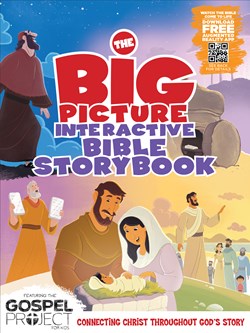By Ed Stetzer
We must not only teach children the stories of Scripture. We must teach them the Story of Scripture.
Children have a faith that is ready to go. Let’s not waste that opportunity by delivering a humanistic Gospel.
We talk a lot about contextualization Gospel communication. How do we share the eternal truth of God in specific locations for specific people who have a specific shared experience?
The Gospel does not change. So the message should remain the same, even as the methods are adjusted for effectiveness.
But how well do we proclaim the Gospel to children? I’m not asking how well we teach children Bible stories, or how well we have taught the moral truths of Scripture.
Are we contextualizing our Gospel communication for children as well as we are for the hipsters in Brooklyn or the tribes in Tanzania?
The Bible as a Collection of Good Stories
Too often we teach the Bible as a series of isolated morality tales, like Aesop’s Fables. We want our children to learn how to live well, so we draw from the Bible stories of people who did the right thing and those who did the wrong thing.
We hope they are getting the idea that good is of God, leading to success, and bad is of Satan, leading to failure. If the kiddos can then live out and retell the story with the right names and main points, we feel like they have a grasp on the Gospel.
Churches have told children tons of good stories, but have we told them the Story?
It is easy to tell the stories within the story, but there is a big picture here. We miss some important points when we offer a slice of the Gospel as if it is the whole pie.
I think about it this way.
There’s this huge story with basically four major acts. Creation, Fall, Redemption, and Restoration. I teach these at my church. You might as well. But how do you teach this to children?
I’m a father of three daughters. The reality is I just don’t want them to know one part of God’s big story. He’s given us His Word that tells the story of His grand and awesome plan, from the first verse to the last. I want them to know the Truth, not just a truth or two.
The Gospel is About What God is Doing
We miss the flow of God if we just take the Bible in isolated parts. And the flow is important to understanding that the Gospel is not just a group of ideas, but rather a plan that has been designed and implemented by a loving God for the saving of humans.
Ideas aren’t as personal as a plan. The plan runs the length of Scripture. So for example, we hear Jesus say in 1 Corinthians 11, “This cup is the New Covenant in My blood. Do this as often as you drink it in remembrance of Me.”
But we don’t remember that Moses said, “This blood is a symbol of the covenant” in the Old Testament. We don’t understand why Abraham would be called to sacrifice Isaac if we don’t understand what would happen as God the Son is sent by God the Father to be the perfect sacrifice for our sins. This interconnectedness happens all through Scripture.
When we take the Bible as a series of isolated morality tales, we think about 66 books with hundreds, if not thousands, of stories contained within them. In actuality, there are not thousands of stories. There are not 66 stories. There aren’t even two stories with the Old and New Testament. There is one story and that is the story of what God is doing—redemptive history.
We want to teach morals to kids, but we don’t want them to become moralists.
The Gospel is Not a Self-help Program
Part of the challenge is in the midst of sharing the Gospel. We want to teach morals to kids, but we don’t want them to become moralists. Yet that is a facet of the predominant religion of our culture today—moralistic therapeutic deism.
Christian Smith coined this phrase.
Moralism is the idea that whatever God is out there wants you to be a good person. It’s also therapeutic. It makes you a better person. It’s actually good for you to have some spirituality in your life. And deism is merely the belief in some God doing something up/out there.
While many people would not self-identify as moralistic therapeutic deists, that is exactly what they are, practically speaking.
They often draw their theology from various sources, including the Bible. But they cherry pick Bible stories that work well with their worldview and adopt the morality found in the story. This will make them feel better and pleasing to God. Mission accomplished.
But that isn’t our mission. That’s not our desire.
The Gospel is that sinners have been saved and are part of a family of believers who edify and equip one another to go out to other sinners and tell them about the Savior. Scripture tells us how God has been searching for and saving people from the first Garden to the Eternal City. We have the privilege of telling that to others, including kids.

Contextualization for Children is Essential
I’m not a children’s pastor and do not have a Ph.D. in educational pedagogy.
Yet, I can tell that that we should not let the fact that children are still learning how to learn keep us from sharing the whole counsel of God with them. When Jesus taught about our acceptance of the Gospel, He said that we must become as children.
Children were designed to hear about the things of God and have faith in them with few hurdles. So let’s be honest with them about the Gospel. It will make more sense if it is delivered holistically, and it will have a greater effect in their lives.
Definitely contextualize, as you would anywhere to anyone else. But do not strip the Gospel of its power in your delivery. God has a Story, and they are in it.
How can we more effectively teach stories without extracting them from the Story? What have you found as you teach children about the bigger story? What part of the Gospel is the most difficult to contextualize for children?
Some Resources
Thankfully, many gifted people see the need to teach the whole Story of Scripture to children. There are dozens, if not hundreds, of great resources available to the Church today to teach children about Jesus, the Gospel, and God’s Word. There are some links to some below. Feel free to suggest your tools in the comments below as well.
-
The Gospel Project for Kids—Download a full month preview of The Gospel Project for Kids and see how we’ve designed this Bible study material to not only teach kids the stories of the Bible, but the Story of the Bible—the Story of redemption through Jesus Christ.
Ed Stetzer is the Executive Director of LifeWay Research Division.
Originally posted at christianitytoday.com/edstetzer.






